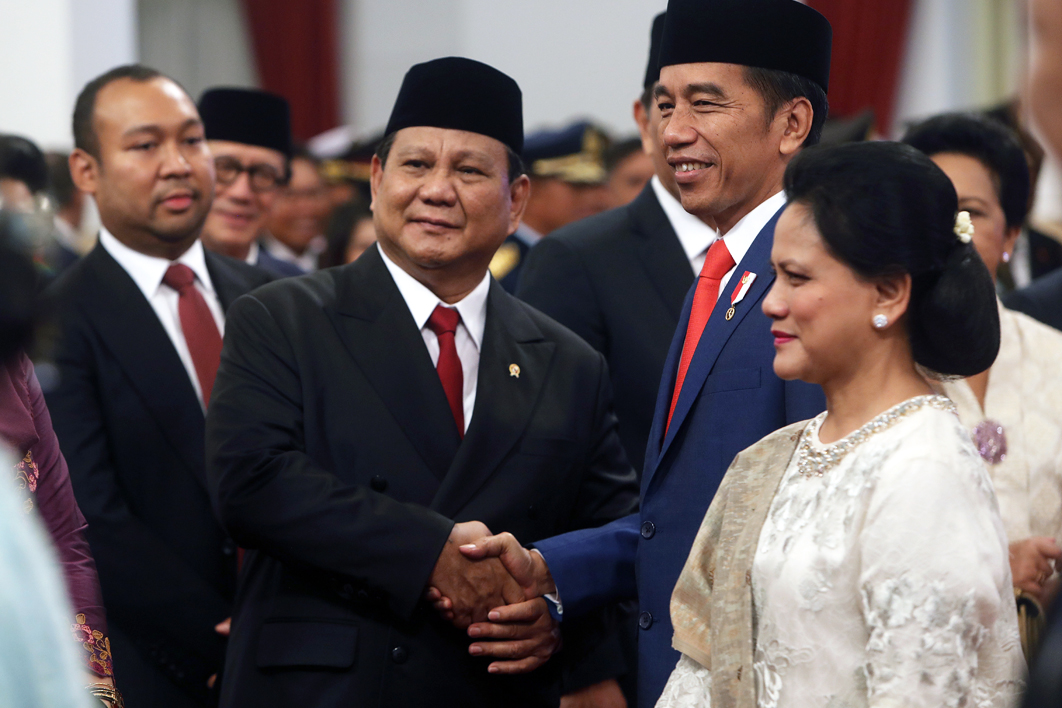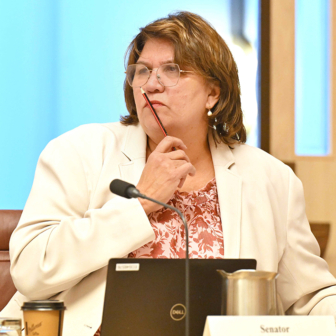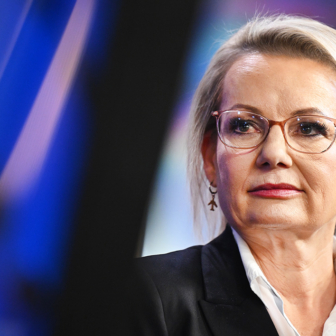A few weeks before Indonesia’s presidential election in 2014, I had coffee with a left-wing activist who’d volunteered for Joko Widodo’s presidential campaign. I enquired about her state of mind, given that polls suggested that the former general Prabowo Subianto might be headed for an upset victory. “Honestly, I’m scared that my friends and I can’t live safely in this country if Prabowo becomes president,” she replied with surprising intensity.
That fear of a democratic comeback for Prabowo — one of the most odious of Suharto’s henchmen — was palpable among Indonesian progressives in the last weeks of the 2014 campaign. It galvanised them in 2014, notwithstanding Jokowi’s own entanglements with the legatees of Suharto’s New Order era. When Prabowo stood again earlier this year, many stuck with Jokowi for the same reason, long after it was clear that their president was not the reformer many (including me) had hoped he would be.
You can only imagine, then, how those progressive voters felt this week when Prabowo gracefully accepted the offer of a senior position in Jokowi’s second-term cabinet. Amid a process which is already being panned in the Indonesian press for its accommodation of political parties and vested interests, his appointment as defence minister has dominated international attention. As one Australian academic quipped, “What was that election for again?”
Prabowo is a grossly inappropriate choice for the defence portfolio. After Suharto’s resignation he was dismissed from the military for organising the abduction and torture of anti-regime activists, and he faces serious questions over his role in atrocities during the occupation of East Timor. Not that Western governments are likely to care: Prabowo has recently expressed the right concerns about an “ever-expansive” China, and will be a reliable ally in the fight against terrorism, his own election-time alliances with Islamic hardliners having been sidelined in favour of reconciliation with the nationalist and moderate Islamic parties that dominate Jokowi’s coalition. But Prabowo is ambitious, and nobody knows whether he is joining the government in order to white-ant it, or to inherit it when Jokowi leaves office in 2024.
On the one hand, Prabowo’s appointment seems extraordinary — somewhat like Hillary Clinton being appointed to cabinet not by Barack Obama but by Donald Trump. At the same time, the circumstances of Prabowo’s return to public office are emblematic of some broader pathologies of post-Suharto politics. Democratic accountability, most people would think, rests upon the idea that the public votes leaders and parties out of office as much as into it. But in Indonesia, ideological and political economy factors encourage the formation of oversized ruling coalitions, of the kind Jokowi has pursued, that are designed to accommodate a broad swathe of elite factions and social groups — including the notional election “losers.”
Announcing the new cabinet, Jokowi exhorted his new ministers not to be corrupt, but he knows that opportunities for rorts are the whole point of these “fat” coalitions. Much of the viability and influence of parties and religious organisations is dependent on their delivering patronage — pork-barrel projects, jobs for the boys, government contracts, favourable regulatory decisions — to their clienteles. For parties, kickbacks collected in this process are an important source of operational funds. The prospect of controlling a ministry and its budget is one reason why, though parties compete vigorously with each other in elections, they then “enter power-sharing agreements that effectively void voters’ preferences.”
Even when viewed in light of these conventions, and judged by the standard Jokowi set in his first term, the new cabinet is qualitatively worse than those that preceded it. It hews less to the tradition of representational diversity that Indonesian presidents usually honour. At a time when Papuan grievances are driving civil unrest and observers worry that anti-Chinese prejudice is growing, there is no indigenous Papuan or ethnic Chinese Indonesian in the ministry, and only five out of thirty-four portfolios are held by women, a decrease from Jokowi’s first term.
And it’s not as if those ministers who did make the cut are an impressive bunch overall. The new health minister is a controversial army doctor who was sanctioned by Indonesia’s medical association over his promotion of an unproven “brain wash” therapy for stroke patients. The pro-Jokowi media tycoon Surya Paloh had a politician from his Nasdem Party installed as communications minister and now has the luxury of regulating his own media empire. Last month, tens of thousands of Indonesian students were protesting the weakening of anti-corruption laws, a draconian new criminal code, and the government’s persistent failure to discipline industry for its role in Indonesia’s forest-fire crisis. Yet forestry and environment minister Siti Nurbaya Bakar, another Nasdem Party cadre, has been kept in her portfolio. The hapless justice minister, Yasonna Laoly — whose ministry co-authored the bills most forcefully rejected by the protesters — has likewise been kept in place.
After Jokowi was re-elected in June, he told the Associated Press that he no longer had a “political burden.” His cabinet just confirms the observation of one Indonesian academic that the “burden” he was thinking of wasn’t the demands of his elite coalition partners, but those of voters and civil society.
The abandonment of any pretence of institutional reform is not all that has changed after the election. This cabinet reflects much more clearly than in Jokowi’s first term a renewed atmosphere of ideological conflict between proponents of the religious pluralism that has long dominated the political mainstream and the Islamism that is ascendant in an increasingly pious society — and particularly among the urban middle classes who play an outsize role in cultural and political life.
The former national police chief Tito Karnavian, a political ally of the president, has been appointed as home minister, a position with wide powers over the civil service and regional government. In one of his more surprising appointments, Jokowi has chosen Fachrul Razi, a former army general, as minister for religion — the first time since the New Order that a military man has held this post. Presidential palace officials briefed the media this week that the two will spearhead a “deradicalisation” agenda within Indonesia’s civil and religious bureaucracy, which pluralist and moderate organisations have long worried is being colonised by sympathisers of radical groups like the now-banned Hizbut Tahrir Indonesia or the mainstream Islamist party PKS.
Indonesian pluralists and many westerners will be encouraged by the idea that the Islamic far right will no longer be indulged by the state, as it was under former president Susilo Bambang Yudhoyono, who saw conservative Muslims as an important part of his political coalition. But those who know what the rhetoric of “deradicalisation” signifies in the current political climate in Indonesia — and recall what it meant during the New Order — are wary of what such a crackdown on an ill-defined “radicalism” might mean in practice.
Indeed, what has (re)emerged under Jokowi is a strain of “nondemocratic pluralist” thinking, which sees the threat to Indonesian social cohesion and national identity posed by Islamism as so acute as to justify restrictions on freedom of association (such as the decree used to ban Hizbut Tahrir in 2017) and purges of Islamist sympathisers in the bureaucracy, something which anecdotal evidence suggests has been quietly under way for some time under Jokowi. One need only look to the experience of the Arab world, or even the New Order, to see how ineffective the promotion of an aggressive nationalism — combined with the delegitimisation of Islamist movements and discrimination against their followers — is likely to be as a remedy for the spread of Islamist ideals in society.
The new cabinet, then, embodies both what has been rotten about Indonesia’s post-Suharto politics since the beginning and the new problems being created and exacerbated by Jokowi’s leadership. It’s tempting to say that Indonesians had better hope they get lucky with their presidential candidates in the 2024 elections — yet if there’s one idea that Jokowi’s presidency has put to rest, it’s that Indonesian democracy needs a saviour. •




